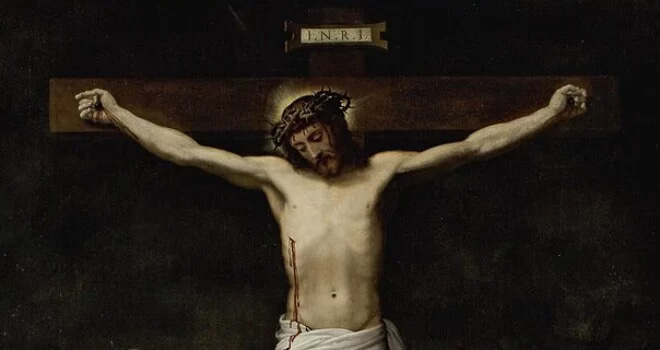From Our Sufferings to His
The final installment in my weekly series for Lent on the Christian meaning of suffering and the Cross.
As I’ve posted the last six Fridays, I’m publishing a weekly series of reflections at Catholic Exchange during Lent. Here is a link to the concluding article in the series along with the accompanying prayer of Consecration to the Holy Cross. I’m also pleased to include below a brief excerpt from this article, which explores the great paradox of the Christian faith: that the scandalously brutal Cross of Christ became the most beautiful, powerful, and liberating symbol of love the world has ever known.
As I mentioned in the opening article in this series, my work as a psychiatrist frequently reminds me that everyone suffers. Certainly, some people suffer far more than others, but in a fallen world some degree of suffering is unavoidable for everyone. We rarely know how and to what extent other people suffer, because the worst forms of suffering are often hidden. But as I have tried to show in these reflections, even a life of tremendous suffering—if it is lived in Christ, with Him, and through Him—is a life of freedom.
If we want to follow Jesus, we cannot shun the crosses He sends us daily. Our Lord wants all of His disciples to embrace the Cross, as He instructed us in the clearest possible terms: “If any man will come after Me, let him deny himself, take up his Cross, and follow Me” (Mt. 16:24). What does this mean for us? It means we cannot just endure with passive resignation the suffering in our own lives; we must actually learn to be thankful for it, for love of Him. Whatever He allows us to suffer is always sanctifying, always for our good, even when we do not immediately see the fruits in this life.
It is pointless to spend time wondering about or longing for the life I would have had, or the person I might have been, had I not endured the sufferings that have shaped me. St. Josemaria Escriva referred to this trap as “mystical wishful thinking”—if only I had different parents, if only I had married someone else, if only I had a different profession, if only I were healthier, or younger, or older, and so forth. Such fantasies are at best a waste of time and at worst a temptation to abandon our vocation. Instead, I need to focus on the life I do have, which is only possible because of what I have suffered.
This is the life God has given to me, and insofar as it is from God, it requires my gratitude. To repeat, the life I actually have is the best life for me because it is from God. I am fully aware that this is difficult and challenging for us to understand and accept. To be clear, God does not ask us to like our suffering; but He does ask us to love the lives He has given to us—in good times and even in times that seem horrendous. God works all things for the good of those who love Him (cf. Rom. 8:28). To be sure, it may be hard to see this until we enjoy the perspective of eternity; but when we do, we will realize that even that which seemed bad, which felt unbearable, was working for our good.
Click here to read the rest of the article. The previous articles of the series can be found here, and the accompanying prayer of Consecration to the Most Holy Cross of Jesus can be found here.





This is a beautifully written article. Thank you for all you do!! May the Lord bless you and your family always.
Thank you for this-I dearly needed the reminder today! May the Father God and dear Jesus bless you and yours!